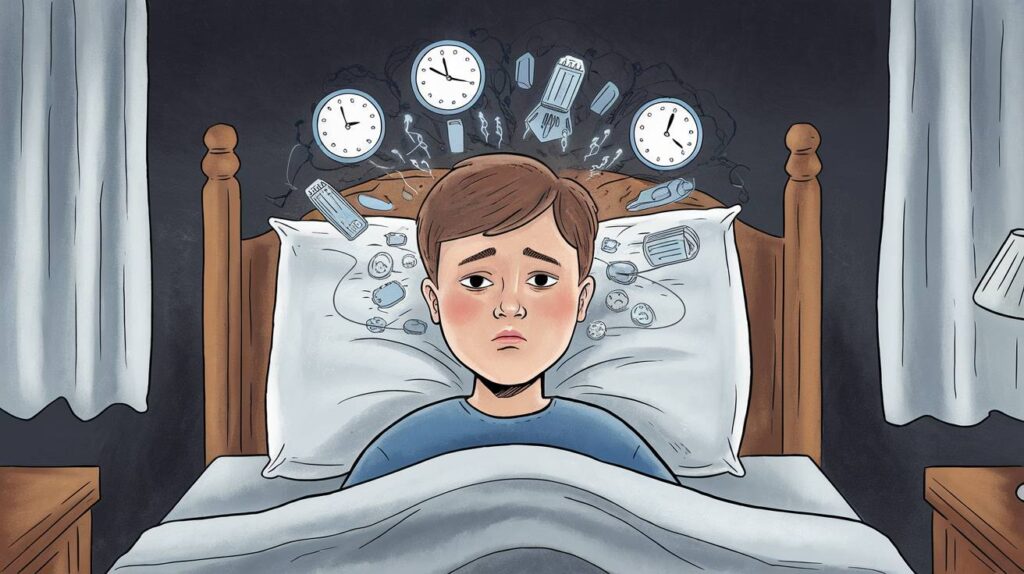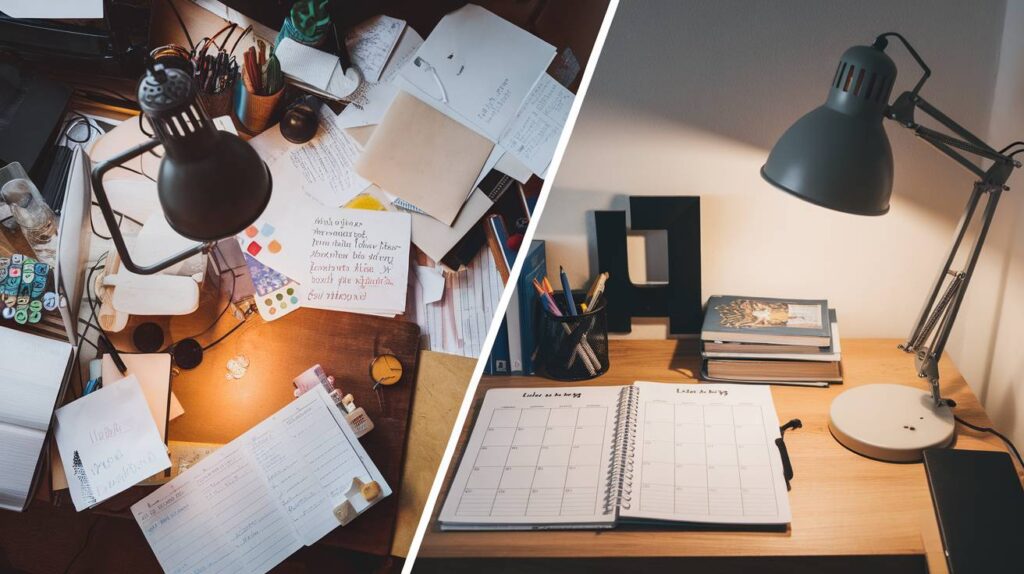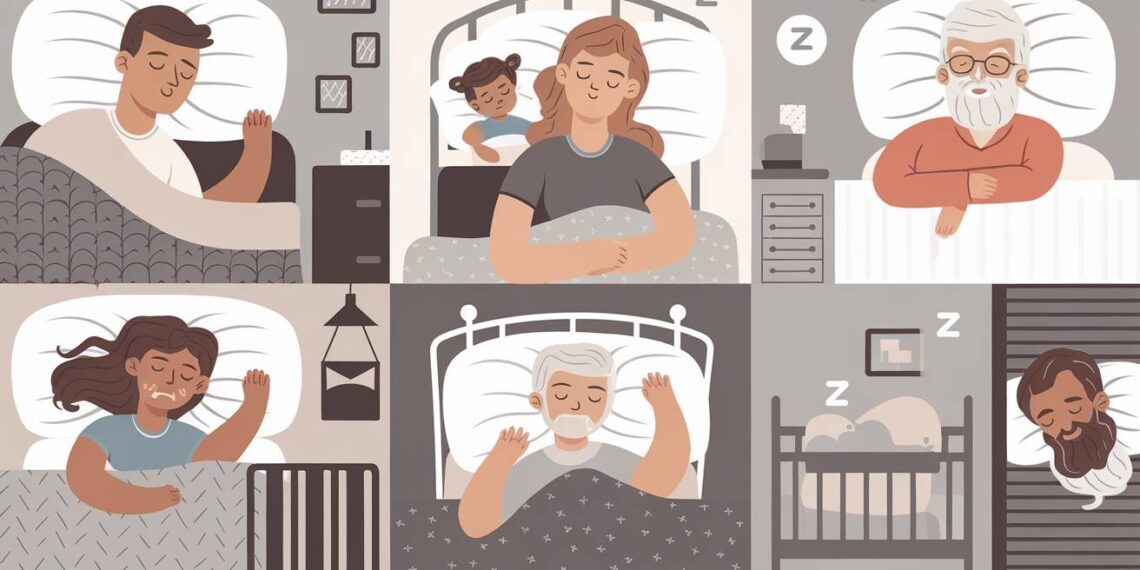Ever find yourself staring at the ceiling in the middle of the night, unable to drift back into dreamland? You’re not alone. Middle insomnia, the knack of waking up hours into sleep and struggling to fall back, affects countless individuals seeking restful nights. Whether it’s stress, irregular schedules, or the challenges of parenthood, understanding the underlying causes is the first step toward reclaiming your slumber. Dive into the complexities of middle insomnia and uncover effective strategies to overcome this disruptive sleep thief, paving the way for healthier, more rejuvenating nights.
Main Key Takeaways
- Identifying Middle Insomnia: Understanding the nature of waking up during the night and its impact on daily life.
- Stress and Anxiety: How these emotional states disrupt sleep patterns and contribute to middle insomnia.
- Lifestyle Factors: The role of irregular sleep schedules and shift work in causing sleep disturbances.
- Aging Effects: Age-related changes that make older adults more susceptible to middle insomnia.
- Medications: How certain medications can interfere with sleep and strategies to mitigate these effects.
- Parenthood Challenges: The unique sleep disruptions faced by new parents and practical tips to manage them.
- Effective Treatments: Overview of Cognitive Behavioral Therapy, sleep hygiene, and relaxation techniques to combat middle insomnia.
Unraveling Middle Insomnia
What is Middle Insomnia?
Middle insomnia’s like the nighttime party crasher—ever wake up mid-snooze and can’t seem to drift back off? That’s the crux of it. You might find yourself tossing and turning, which ain’t fun when you’ve got a day ahead. Here’s what typically makes up this stubborn sleep thief:
| Characteristic | Description |
|---|---|
| Sleep Onset | Trouble dozing off initially. |
| Sleep Maintenance | Those pesky wake-up calls all night long. |
| Sleep Duration | Rising at the crack of dawn, uninvited. |
Diving into the nitty-gritty of middle insomnia helps folks lay down the blueprint to tackle it. When you know the enemy, it’s easier to find out what’s been yanking your chains at night.
Importance of Understanding Middle Insomnia Causes
Pinpointing why you’re wide-eyed at 2 AM is like solving a mystery. Crack the case, and you’re on the way to fixing it. Appreciating the reasons behind your insomnia gets you on the path to snooze-town. Here’s why it matters:
- Eye-Opening Awareness: Clue in on how stress, stream screens, or even that late-night pizza might be ruining your slumber. Knowing is halfway to nixing bad habits.
- Custom Fixes: Get picky with your approach. If anxiety’s your sleepy-time villain, meditation for sleep might be your hero. For night owls on odd schedules, sleep restriction therapy could work wonders.
- Chill Out on Sleep Woes: Recognizing that your insomnia’s not just random might calm your racing mind, making sleep seem less like an uphill battle.
| Cause of Middle Insomnia | Impact on Sleep |
|---|---|
| Stress and Anxiety | Keeps you wired, kissing goodnight to sweet dreams |
| Irregular Sleep Patterns | Who needs a body clock anyway? Cause chaos instead |
| Age-Related Changes | Leads to restless nights and wakeful wee-hours |
Getting to grips with what’s making sleep slip away is your ticket to better nights. This know-how isn’t just trivia—it’s a launchpad for meaningful change. If you’re keen on digging deeper, check out how long does insomnia last or the tussle of insomnia vs anxiety for more light-bulb moments.

Stress and Anxiety
Can’t catch a wink because of stress and anxiety? You’re not alone. These two troublemakers often throw a wrench in your sleep schedule, causing middle insomnia—the nightmare of waking up in the middle of the night with thoughts playing like a broken record. Let’s explore how stress and anxiety gang up on your sleep and sneak in some tricks to help you catch those elusive Zs.
“Stress not only keeps you awake but also steals away your peace, making every night a new challenge.” – Dr. Emily Rogers, Sleep Specialist
Impact of Stress on Sleep
Stress is like a constant alarm bell in your body, and it’s no surprise it messes with your snooze time. When stress kicks in, your body unleashes this hormone called cortisol—like it’s ready to tackle a bear—and bam! Suddenly, falling and staying asleep becomes a Herculean task. If stress is always knocking at your door, chances are you’re tossing and turning throughout the night, wondering why you ever took your peaceful pre-stress sleep for granted.
Check this out: people who stress a lot wake up more during the night than their chilled-out counterparts. So, if you’re waking up at all odd hours, stress might be playing a major role here.
| Stress Shindig | Nighttime Wake-ups Galore |
|---|---|
| Low Vibes | 1 – 2 times |
| Middle Ground | 3 – 4 times |
| All Out | 5+ times |
If you wanna show stress the exit, try some cool techniques. Things like meditation for sleep and keeping your nights on point with a sleep hygiene checklist can turn the tables and bring back sweet dreams.
How Anxiety Affects Middle Insomnia
Ah, anxiety. The brain’s way of making you believe you can solve all your life’s problems in the middle of the night. Those anxious thoughts keep buzzing and can wreck your peace, making it tough to drift into dreamland. You’re jittery, on high alert, and bam! You wake up in the middle of the night with worries magnified a hundred times.
Experts say anxiety and crappy sleep play a game of tag—you’re constantly it. Worry about sleep turns into sleepless nights, turning into more worry. A vicious cycle that keeps feeding itself, leaving you counting sheep by default.
But hey, don’t lose hope! Take a stand against anxiety with stuff like exercise for insomnia and learn to break the insomnia cycle. Nip both stress and anxiety in the bud and they’ll no longer ruin your bedtime.
In a nutshell, when stress and anxiety gatecrash your sleep party leaving your bed feeling like a battleground, recognizing the riff-raff is your first move to reclaiming your nights. Spotting the damage and strategizing better habits can light up your nights and perk up your days.

Lifestyle Factors
Your everyday habits can really mess with your sleep, especially if your routine’s all over the place or you’re doing the night shift hustle. It’s a struggle to catch those Z’s when your schedule is as unpredictable as a cat pacing a new neighborhood.
“Consistent sleep patterns are the foundation of restful nights. Embracing routine can transform your sleep health.” – John Doe, Behavioral Therapist
Irregular Sleep Patterns
If your bedtime story involves skipping chapters, you’re probably finding it hard to drift back to dreamland in the middle of the night. And yeah, hitting the hay and getting out of bed at the same time every day sounds like a buzzkill, but your body’s internal clock is like, “Make up your mind already!”
Check out this look-see at how your sleep style might be messing with your snooze score:
| Sleep Plan | Average Hours Catching Z’s | Sleep Score (1-10) |
|---|---|---|
| Like Clockwork | 7-9 | 8-10 |
| Like a Rollercoaster | 5-7 | 4-6 |
| Night Owl Shifts | 4-6 | 3-5 |
To help you pull a 180 on your sleep chaos, a sleep hygiene checklist might just be your wingman. This means doing stuff like hitting the hay the same time every night, ditching the phone before bed, and unwinding with something chill.
Shift Work and Middle Insomnia
Ah, the life of a shift worker—where society says sleep but your job says “Nah, you’re up.” If you’re clocking in at odd hours, your body’s trying to figure out if it’s bedtime or breakfast time.
Here’s what night shifters often face:
- Can’t hit the sack after work
- Wake up call—not the good kind
- Sleep that feels like a dud
Surveys show that folks on the night shift have more trouble snoozing than your nine-to-five crowd, with a lot of them feeling like they’re running on empty. To tackle this, you might wanna try picking up tricks designed for folks like you. Something like sleep restriction therapy could keep your body clock in check.
Understanding how your lifestyle’s throwing shade on your sleep is key to sorting out that middle insomnia problem. Rolling with routines and making your nap nook a chill spot can up the quality of your sleep game. Don’t forget extras like exercise for insomnia and meditation for sleep that can be game-changers for counting sheep more efficiently.
Aging and Middle Insomnia
As we get older, many of us notice tweaks in our sleep patterns—sometimes it’s like our snooze button has a mind of its own. Managing these changes can be key to taming middle insomnia; that’s when you wake up around midnight and feel like sleep fled the scene.

Age-Related Sleep Changes
Aging often tweaks how we sleep, messing with how restful we feel. Some of the pesky changes that can lead to middle insomnia include:
| Sleep Change | Description |
|---|---|
| Decreased Deep Sleep | Once people hit their golden years, they don’t dive into that deep-sleep zone nearly as often, leaving them groggy by morning. |
| Increased Wakefulness | They might pop awake more frequently during the night. |
| Shifts in Circadian Rhythms | Our internal clock can start doing its own thing, making us hit the hay, and wake up, earlier than we’d like. |
These shifts can make older folks more vulnerable to middle insomnia, while aches, medications, and stress are like sneak attacks on their sleep.
Strategies for Managing Middle Insomnia in Older Adults
Luckily, there’re a bunch of ways to fight back against middle insomnia and get that sweet, sweet sleep on track. Here are some tricks to try:
| Strategy | Description |
|---|---|
| Sleep Hygiene | Stick to a sleep routine and create a comfy sleep space. Check out a sleep hygiene list for ideas. |
| Exercise | Staying active with gentle workouts like a stroll or yoga can help keep insomnia at bay. Learn more on exercise for insomnia. |
| Meditation | Try some relaxation techniques to lull your mind into peace-mode come bedtime. Explore meditation for sleep. |
| Cognitive Behavioral Therapy for Insomnia (CBT-I) | This is like a mind reset for better sleep habits. Find out does CBT-I work for insomnia. |
| Diet and Nutrition | Eating certain foods might help you snooze better. Look into foods that help you sleep. |
By weaving these habits into daily life, older adults might find themselves getting more shut-eye and dodging middle insomnia pitfalls. Dig deeper into other sleep hurdles at why can’t I fall asleep and learn how to break insomnia cycle for more ideas.
Medications and Middle Insomnia
Certain meds might mess with your nighttime bliss, leading to things like middle insomnia—yep, the one that has you staring at the ceiling at ungodly hours. Knowing what pills could be your sleep’s worst enemy is a solid move for tackling the issue head-on.

Meds That Mess with Your Zzz’s
Plenty of prescriptions and off-the-shelf solutions might be screwing up your sleep schedule. Common culprits lurking in your pill bottle might include:
| Type of Meds | What’s On the Label | What’s It Doing to Your Snooze Time |
|---|---|---|
| Antidepressants | SSRIs, SNRIs | Keeps you up, even if you’re down |
| Antihistamines | Cold meds galore | Knock you out cold, then have you up counting sheep |
| Stimulants | ADHD treatments | Give you that wired feeling, making shut-eye tricky |
| Blood Pressure Meds | Beta-blockers | Tosses your sleep rhythm outta whack |
| Hormonal Pills | Birth control | Messes with the natural clock keeping |
There’s a little peek at meds that might mess with your slumber. Folks on these should really chat with their doc about any sleep troubles that crop up.
Handling Med-Induced Middle Insomnia
If your meds are the sleep thief, here’s some ways to grab your rest back:
- Talk with Your Doc: Got sleep beef? Take it to your doctor, who might know a med swap that doesn’t torch your dreams.
- Good Sleep Habits: Turn your room into a sleep haven. Check out our sleep hygiene checklist for how to do just that.
- Chill-Out Time: Dive into some meditation for sleep or combat insomnia with a bit of deep breathing pre-bed. Could be your ticket back to dreamland.
- Tweak Your Timing: Sometimes shifting your med schedule can ease the nighttime drama. But, don’t do this without your doc’s nod.
- Check Your Lifestyle: How you live impacts how you sleep. An exercise for insomnia routine or munching on foods that help you sleep could mean fewer interruptions at night.
Trying these could ease middle insomnia brought on by meds. If stress or nerves are also messing with your sleep, our piece on insomnia vs anxiety might shed some extra light on your troubles and how to sort ’em out.
Parenthood and Middle Insomnia
Sleepless Nights with Baby
So, you’ve got a little one at home, and the bags under your eyes are heavier than that diaper bag. Welcome to the joys of parenthood! Let’s talk about middle insomnia, a fancy way of saying you can’t keep those peepers shut through the night. With tiny feet kicking through the early hours, lots of new parents find themselves waking up more often than they’d like. Toss in some anxiety about keeping the baby alive and the exhaustion that comes with it, and you’ve got a first-class ticket to Insomniaville.

Research shows that most parents with newborns catch way fewer z’s than the body craves, which leaves them crankier than a toddler told to share. Below is a quick look at how new sleep patterns shape up compared to what’s ideal.
| Parent’s Sleep Pattern | Average Hours of Sleep | Recommended Sleep Needs |
|---|---|---|
| New Parents (0-3 months) | 4-6 hours | 7-9 hours |
| New Parents (3-6 months) | 5-7 hours | 7-9 hours |
Tricks for Better Sleep (No Magic Wand, Sorry)
Getting a good night’s sleep feels like hunting for a needle in a haystack, but don’t worry, there are ways to improve the situation. Here’s a handful of tricks to help catch some decent shut-eye:
- Stick to a Routine: It might not sound exciting, but going to bed at the same time each night and winding down with some soothing activities can help trick your body into sleeping when it’s supposed to.
- Tag Team the Night Shift: If you’re lucky enough to have a partner, take turns with baby duty so at least one of you gets a few hours of uninterrupted sleep—which is better than no hours, trust us.
- Make Your Room a Sleep Haven: Turning your room into a cozy sleep cave can help. Think blackout curtains, white noise, and maybe the sound of waterfalls (or whatever floats your boat). Here’s some more wisdom: sleep hygiene checklist.
- Call for Reinforcements: Don’t be shy about asking family or friends to pitch in with baby care so you can sneak in a much-needed nap.
- Find Your Zen: Whether it’s meditation or breathing exercises, finding ways to chill out can ease that nervous energy and help you sleep better. For more, we’ve got you covered here: meditation for sleep.
- Get Moving: Exercise is mostly magic; it can help tire you out just enough to improve the quality of sleep you’re getting. Get some tips on this here: exercise for insomnia.
Tackling middle insomnia while dealing with a new family addition is like solving a puzzle when some pieces have rolled under the couch. Hold on to patience and flexibility, though, and eventually those pieces will turn up. Following these practical hacks can lead to better snooze sessions and strengthen your ability to keep up with life’s whirlwind.
Seeking Help
Tackling that pesky middle-of-the-night wake-up routine calls for some teamwork. Knowing when to rope in the pros and eyeing different treatments can seriously up your sleep game.
Importance of Seeking Professional Advice
Being jolted awake in the wee hours doesn’t just mess with your mood—it can throw a wrench in your whole life. Loads of folks wrestling with middle insomnia aren’t sure when it’s time to holler for backup. Looping a healthcare ace into your corner can help pin down what’s keeping you up, be it stress, lifestyle quirks, or just getting a bit longer in the tooth.
A pro can help weed out other culprits behind your sleepless nights, like anxiety, depression, or pesky drug side effects. The sooner you get a handle on it, the less chance there is it’ll get uglier. The right expert advice, custom-tailored to your unique needs, can be just what’s called for—leading you to a sleep plan that actually clicks.
Possible Treatments for Middle Insomnia
This ain’t a one-size-fits-all game. From tweaking your daily grind to trying out some focused therapies, you got options:
| Treatment Option | Description |
|---|---|
| Cognitive Behavioral Therapy for Insomnia (CBT-I) | Say goodbye to those self-sabotaging sleep thoughts and habits. It’s got a solid reputation for kickstarting better sleep routines. Want the lowdown? Dive into does CBT-I work for the nitty-gritty. |
| Sleep Restriction Therapy | Less pillow time means you use your snooze hours more wisely. Dive deeper into it in our sleep restriction therapy. |
| Medication | Sometimes, a doc will dish out some zzz-enhancers. Just make sure to chat about any side effects or possible clashes with your regular meds. Our medications that affect sleep guide can fill you in. |
| Relaxation Techniques | Chill out with meditation or some deep breathing to kick anxiety to the curb. We break it down for you in meditation for sleep and exercise for insomnia. |
| Sleep Hygiene Improvements | Little tweaks in your bedroom setup or bedtime rituals can really dial up your sleep quality. Scope out our sleep hygiene checklist for pointers. |
Given all the stuff that can keep you tossing and turning, mixing and matching might give you the best shot at hitting the hay peacefully. Balancing life’s crazy hustle, unwinding properly, and sticking with a solid routine can put you on the path to dreamland. If middle-of-the-night wake-ups have got you down, it might be time to try a new game plan and reclaim those sweet, sweet dreams.
Main Tips
- Maintain a Consistent Sleep Schedule: Go to bed and wake up at the same time every day to regulate your internal clock.
- Practice Good Sleep Hygiene: Create a relaxing bedtime routine and environment, free from distractions and electronic devices.
- Manage Stress and Anxiety: Incorporate stress-reducing activities like meditation, deep breathing, or yoga into your daily routine.
- Limit Caffeine and Heavy Meals Before Bed: Avoid stimulants and large meals in the evening to prevent sleep disruptions.
- Seek Professional Help: If middle insomnia persists, consult a healthcare provider for tailored treatments such as CBT-I or medication adjustments.
Final Thoughts
Middle insomnia can feel like a relentless thief, stealing your nights and leaving you exhausted during the day. However, by delving into its causes—stress, irregular schedules, aging, medications, and parenthood—you can take informed steps to reclaim your rest. Implementing strategies such as maintaining consistent sleep routines, practicing relaxation techniques, and seeking professional help when needed can make a significant difference in your sleep quality. Remember, understanding the root of your insomnia is the first step towards effective management and a healthier, more energized you. Embrace these insights and take proactive measures to ensure that middle insomnia no longer dictates the quality of your nights and, ultimately, your days. Prioritize your sleep health as an essential component of your overall well-being, and witness the transformative power of restful, uninterrupted sleep.
Conclusion
Middle insomnia is a pervasive challenge that can undermine your overall health and well-being. By navigating the multifaceted causes—from the debilitating grip of stress and anxiety to the disruptive rhythms of shift work and the natural sleep changes that come with aging—you embark on a journey toward better sleep health. Recognizing the influence of medications and the sleepless nights of parenthood brings clarity to the complexities of your sleep patterns. Implementing effective strategies such as Cognitive Behavioral Therapy, maintaining consistent sleep hygiene, and embracing relaxation techniques can transform your nightly experience. Moreover, seeking professional guidance ensures a personalized approach to overcoming insomnia. As you take these empowered steps, you not only reclaim your nights but also enhance your daytime vitality, paving the way for a more balanced and fulfilling life. Embrace this comprehensive understanding of middle insomnia, and let it be the foundation upon which you build healthier sleep habits and a more resilient you.
FAQs
1. What is middle insomnia and how does it differ from other types of insomnia?
Middle insomnia involves waking up during the night and struggling to fall back asleep, unlike difficulty falling asleep at bedtime or waking up too early without the ability to return to sleep.
2. How do stress and anxiety contribute to middle insomnia?
Stress and anxiety can activate the body’s stress response, increasing cortisol levels which disrupt sleep continuity and make it difficult to maintain uninterrupted sleep.
3. What lifestyle changes can help alleviate middle insomnia?
Establishing a consistent sleep schedule, improving sleep hygiene, reducing screen time before bed, and incorporating relaxation techniques can significantly improve sleep patterns and reduce middle insomnia.
4. Can medications cause middle insomnia, and what should I do if they do?
Yes, certain medications like antidepressants, antihistamines, and stimulants can interfere with sleep. Consult your healthcare provider to adjust your medication regimen or explore alternatives if insomnia occurs.
5. How can parents manage middle insomnia caused by caring for a newborn?
Parents can implement strategies such as establishing sleep routines, sharing nighttime duties with a partner, creating a conducive sleep environment, and seeking help from family or friends to ensure adequate rest.








